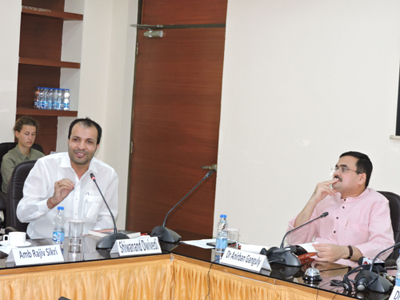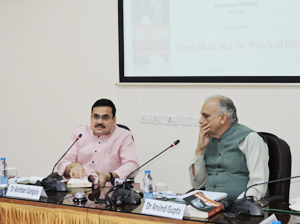A discussion was held in VIF on July 23rd, 2019 by the esteemed authors Dr. Anirban Ganguly, and Shiwananda Dwivedi, on their recently released book, “Amit Shah and the March of BJP”, published by Bloomsbury publishers. Dr. Ganguly is the Director of Dr. Syama Prasad Mookerjee Research Foundation (SPMRF), New Delhi, and Mr. Dwivedi is a columnlist and research fellow at SPMRF. The book is an enthralling chronicle of the political life and journey of the newly appointed Home Minister of India, Sh.Amit Shah, and narrates the account of how he’s led the party to its massive success as its chief. The book presents a compelling case study for scholars of history, political organisation, and campaign strategists alike. The event was attended by several dignitaries, members of the diplomatic corps, bureaucrats, and members of the civil society.
 Dr. Arvind Gupta, in his welcome remarks, introduced the authors and spoke about the contemporary relevance of the book. He opened the discussion by praising the authors for providing a rich account of BJP’s evolution as a political organisation over the years. Dr. Ganguly began the discussion by recalling how the authors were inspired to write the book while documenting Shah’s tours across the country, when he had undertaken a plan to rejuvenate and restructure the party after assuming office as the party’s President, in 2017. The objective behind the book was to explore the ideological origins and systematic working of Shah’s master plan that transformed the BJP into the formidable political mammoth that it currently is.
Dr. Arvind Gupta, in his welcome remarks, introduced the authors and spoke about the contemporary relevance of the book. He opened the discussion by praising the authors for providing a rich account of BJP’s evolution as a political organisation over the years. Dr. Ganguly began the discussion by recalling how the authors were inspired to write the book while documenting Shah’s tours across the country, when he had undertaken a plan to rejuvenate and restructure the party after assuming office as the party’s President, in 2017. The objective behind the book was to explore the ideological origins and systematic working of Shah’s master plan that transformed the BJP into the formidable political mammoth that it currently is.
 Dr Ganguly also highlighted the need the authors felt to bridge the wide gap that existed in Indian political history narrative. He mentioned that there had been no documentation to assess the growth of Bharatiya Janata Party in the last fifty years. The last time such an exercise had taken place was in 1969, when Craig Baxter, an American diplomat then stationed in New Delhi, authored History of the Jan Sangh: The Biography of a Political Party, with documents he sourced from the old guard of the Jan Sangh. Since then, he said, the Jan Sangh has evolved into the BJP, which has gone onwards from first emerging as the main opposition, to more recently, virtually demolishing the Congress’s monolith, and becoming the world’s largest political organisation. It is the story of this aspirational journey that the authors have brought on paper for the readers.
Dr Ganguly also highlighted the need the authors felt to bridge the wide gap that existed in Indian political history narrative. He mentioned that there had been no documentation to assess the growth of Bharatiya Janata Party in the last fifty years. The last time such an exercise had taken place was in 1969, when Craig Baxter, an American diplomat then stationed in New Delhi, authored History of the Jan Sangh: The Biography of a Political Party, with documents he sourced from the old guard of the Jan Sangh. Since then, he said, the Jan Sangh has evolved into the BJP, which has gone onwards from first emerging as the main opposition, to more recently, virtually demolishing the Congress’s monolith, and becoming the world’s largest political organisation. It is the story of this aspirational journey that the authors have brought on paper for the readers.
He further added that the book also aims to explain the massive increase in BJP’s electoral figures, a hitherto rare occurrence in India for a government at the centre, as seen in the 2019 General elections, to be a consequence of the extremely proactive approach the party continued to exhibit post 2014. As Dr. Ganguly explained, enormous membership drives and outreach programmes, coupled with restructuring the inner workings of the party to empower grassroots workers, have continued to strengthen the BJP. This was further enhanced by an emphasis on building a culture of documentation and scholarship within the party, so as to maintain its ideological continuum. He further noted that at the helm of the party, directing these initiatives was Shah, having honed his administrative skills while climbing the party ranks, beginning as a 13-years old local campaign boy in Gujarat.
 Adding to this, Mr. Dwivedi spoke about how the book fulfills a larger purpose than just recounting Shah’s biography. It exemplifies, he says, the aspirational journey of a political organisation formed by idealist members on a path to democracy, lined by various setbacks, undertaken without compromising on its core ideological and moral values along the way.
Adding to this, Mr. Dwivedi spoke about how the book fulfills a larger purpose than just recounting Shah’s biography. It exemplifies, he says, the aspirational journey of a political organisation formed by idealist members on a path to democracy, lined by various setbacks, undertaken without compromising on its core ideological and moral values along the way.
After the authors concluded their remarks, Dr. Gupta invited noted columnist Smt. Sandhya Jain to present her comments. She appreciated the authors for chronicling the emergence of an indigenous, ideology-backed, political movement in the book. She was followed by other audience members who discussed different aspects about the book, right from Shah’s political strategy in different state elections, to the relationship he shares with the Prime Minister. The authors, while answering these questions, also elaborated upon Shah’s policy on terrorism, his consensus based leadership style, the trials he faced in his personal life, and the politics of narrative building in the country, among other things. Concluding the discussion, the authors touched upon the possibility of chronicling his political journey further, as he assumes a new role as India’s Minister of Home Affairs in the newly formed government.





Post new comment